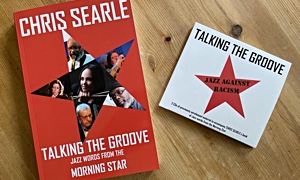Home » Jazz Articles » Book Review » Bob Riesman: I Feel So Good - The Life And Times Of Big ...
Bob Riesman: I Feel So Good - The Life And Times Of Big Bill Broonzy
 I Feel So Good: The Life And Times Of Big Bill Broonzy
I Feel So Good: The Life And Times Of Big Bill BroonzyBob Riesman
Cloth; 336 pages
ISBN 97800226717456
University of Chicago Press
2011
Guitarist and singer Big Bill Broonzy is one of those musicians whose reach cannot be limited to his immediate musical era or genre. Like his peer Lead Belly, Broonzy effected attitudes toward civil rights through his songs. Like Robert Johnson, Broonzy's musical style deeply affected the course of history through his records poured over by future "British invasion" icons such as guitarists Keith Richards and Eric Clapton. Broonzy also mentored the likes of Muddy Waters and John Lee Hooker, thus ensuring the success of the next generation of blues musicians. Broonzy's legacy casts an incredibly long shadow.
What Bob Riesman's interesting and thorough biography makes clear is that not only was Broonzy a dedicated, hard-working musician, but that he cultivated his own myth with skill, understanding that storytelling was a critical aspect to his success. One piece of his life that Broonzy had no control over, however, but that served him well, was the simple timing of his career. His musical presence starts with America's early interest in "race records" and ends with the folk revival and the birth of rock 'n' roll (both events being affected by and paying homage to Broonzy).
Throughout his life, Broonzy changed birth dates, names and family history as it suited the story he was telling, but according to Riesman's research he was born Lee Conley Bradley on June 26, 1903, in Jefferson County, Arkansas. After early regional success, Broonzy relocated to Chicago where he played regularly throughout the 1920s, eventually taking Tampa Red's chair in the group Hokum Boys, where he penned his first in a long series of hits with "I Can't Be Satisfied."
Because he was a skilled songwriter, showman, storyteller and musician, Broonzy toured and recorded steadily throughout the Great Depression. His reputation was such that John Hammond picked him to fill in for the recently deceased Robert Johnson in the famous Carnegie Hall "From Spirituals to Swing" show which brought rural music to the attention of a wider (and whiter) audience, and provided a critical push to the folk revival that would blossom later, and thus provide Broonzy with his most critical musical and financial successes.
Riesman diligently chronicles all aspects of Broonzy's recordings, from backup session guitarist to band leader, from jazz/blues styles to folk blues, Broonzy was a master musician able to communicate no matter the musical setting he found himself in. He was also a hard practicing guitarist. Riesman relates the hours Broonzy spent honing his country blues alternating bass style, for example and the feel for time he achieved through the dedicated practicing.
The Big Bill Broonzy who emerges from Riesman's book is a complex man who used his story (sometimes intentionally fictionalized) to craft an image that would reflect the subjects that he sang about—Jim Crow-era inequality, the Southern African-American culture, the harsh life of rural sharecroppers and the violence that could quickly change lives. Broonzy is rightly remembered for these achievements, but Riesman provides a more layered biography, that puts these accomplishments within the context of their times and places the musician within the tradition from which he sprang. By doing so, Riesman has given readers a deeper understanding of Broonzy's astonishing achievements and how his legacy affected the social and musical landscape thereafter.
< Previous
Comin' On
Comments
Tags
Bob Riesman
Book Reviews
Big Bill Broonzy
Jack Huntley
United States
Leadbelly
robert johnson
Eric Clapton
Muddy Waters
John Lee Hooker
For the Love of Jazz
 All About Jazz has been a pillar of jazz since 1995, championing it as an art form and, more importantly, supporting the musicians who create it. Our enduring commitment has made "AAJ" one of the most culturally important websites of its kind, read by hundreds of thousands of fans, musicians and industry figures every month.
All About Jazz has been a pillar of jazz since 1995, championing it as an art form and, more importantly, supporting the musicians who create it. Our enduring commitment has made "AAJ" one of the most culturally important websites of its kind, read by hundreds of thousands of fans, musicians and industry figures every month.























